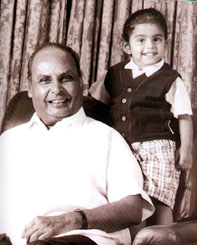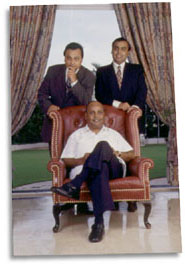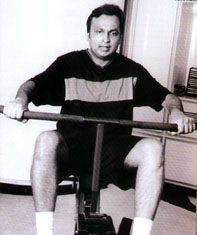Relying
on Reliance
TheAmbanis have
helped four million investors create wealth with
their daring and ingenious business practices
 Dhirajlal Hirachand
Ambani popularly known as Dhirubhai
Ambani (pic: right) has
become corporate India's living legend. Condemned a
decade ago as a manipulator, today Dhirubhai has become a
messiah of the country's investing public. A non-believer
of tried and tested theories, Ambani, a high school
dropout from Chorwad in Gujarat's Junagadh district, has
puzzled conformists and competitors with his brand of
management where the only things that mattered were
results and benefits for his shareholders. Dhirajlal Hirachand
Ambani popularly known as Dhirubhai
Ambani (pic: right) has
become corporate India's living legend. Condemned a
decade ago as a manipulator, today Dhirubhai has become a
messiah of the country's investing public. A non-believer
of tried and tested theories, Ambani, a high school
dropout from Chorwad in Gujarat's Junagadh district, has
puzzled conformists and competitors with his brand of
management where the only things that mattered were
results and benefits for his shareholders.
His financial fireworks coupled with unmatched business
performance has created a mega-wealth that is
unparalleled in India's corporate history. In 20 years
Dhirubhai's Reliance empire has grossed sales of Rs
13,740 crore (Rs 67 crore in 1977) and made a net profit
of Rs 1,653 crore for the year ended 1998. Its assets
have grown to Rs 24,388 crore from Rs 33 crore in 1977.
But the Ambanis' reliance on people for capital support
has paid off. When most industry players went to the
banks for moolah, Dhirubhai went directly to those on
whom the banks relied, the public. He has proved that
wealth, if shared, gets multiplied. A fighter, Ambani
always tried to safeguard his investors' interests along
with his company's. On the afternoon of April 30, 1982,
one such dare-devilry was seen when he took on a
syndicate of brokers who were pushing down the share
price of the company.
It plummeted from Rs 131 to Rs 121 as more than three
lakh shares hit the market. But something that the bears
never dreamt of happened. Challenging them, Ambani's
brokers bought everything that was sold. When Ambani
demanded the delivery of the shares, it was one of those
rare occasions when the art of short-selling lost its
sheen. The panicky bear cartel was forced to buy Reliance
shares from all possible avenues. This crisis, in fact,
made a hero out of Ambani.
And since then Reliance has remained a leader in the
capital markets. All its mega issues have been successful
at home as well as in international markets. Investor
confidence was reaffirmed in Dhirubhai when he declared a
1:1 bonus as demanded by the shareholders at its last
annual general body after a gap of 14 years.
To many the Ambanis epitomise the seedy side of business,
tampering with import quotas, switching share
certificates and pre-empting licences were some of the
charges. Nevertheless, Reliance has built huge capacities
at internationally competitive costs and become a world
leader in petrochemicals. "Reliance has done a
tremendous cleaning up job in the last two years,"
said Milind Karmakar, head of research, Dalal and
Barocha. "The company has brought about a lot of
transparency in its operations in the last two
years."
Says Gul Tekchandani, chief investment officer, Sun
F&C: "Its performance has been defying logic.
Even in a crisis-ridden market in late 1997, when the oil
prices dipped to their lowest in the decade, Reliance has
managed to post a profit which was up by 25 per cent from
last year."
The bourses have reacted positively to the company's
results. Its share price shot up by Rs 8 within the day
and closed at Rs 197.20. During 1997-98 the Reliance
share price increased by 38 per cent while the BSE Sensex
increased by only 16 per cent to reach 3892 points. The
company's share price outperformed the market by 2.4
times! The company achieved an earning per share (EPS)
growth of 22 per cent during the year and declared a
dividend of 35 per cent.
Investors have been largely benefited by Reliance's
ability to customise technology. Its strength lay in the
way it integrated its projects. Take the example of
Reliance Textiles, which was the first Ambani company to
go public after its merger with Mynylon of the Pais who
had once owned the Syndicate Bank. Considering the
polyester content in Vimal fabrics, the choice was to
manufacture polyester staple fibre (PSF) and polyester
filament yarn (PFY). So in 1982 Reliance set up the PFY
project at Patalganga in Maharashtra followed by PSF
capacity in 1986. Next it integrated backwards in
purified terephthalic acid (PTA) in 1986 and paraxylene
(input for PTA) in 1988. It then pocketed the detergent
manufacturers by putting up a plant to make linear alkyl
benzene (LAB) in 1987.
In 1991, the company embarked on its most treasured
project, at Hazira, the largest single multi-feed
ethylene cracker in the world. Hazira is a conglomeration
of many world class plants, churning out polyethylene
(PE), polypropylene (PP), polyvinyl chloride (PVC) , PFY,
PSF, polyester terephthalate (PET) and other
intermediates like vinyl chloride monomer, mono ethene
glycol and pure phthalic acid (PTA). The Hazira plant is
the biggest chemical complex in India.
While this methodology helps in the economies of scale,
there are many bottlenecks such as inadequate port
facilities, erratic water and power supply and high cost.
To overcome these, Reliance went on to create its own
facilities. It built its own jetties in Hazira and a
single buoy mooring, 5 km off the coast, for large
tankers to unload liquids directly into storage tanks.
All Reliance plants are self-sufficient in power.
In fact, the ethylene terminal at Hazira was a stunning
achievement. Before the commissioning of the cracker
plant Reliance imported large amounts of ethylene for its
downstream PVC and PET plants. To transfer the ethylene
at 138 degrees it set up a cryogenic terminal in the deep
sea. An achievement Anil Ambani is proud of: "People
said ethylene transfer is unsafe and not possible in
India. Once we proved that we can do it safely, the world
is copying it."
Reliance uses what is known as the 'sweat technology'
whereby it engineers milk as much as possible from the
plants. To enhance output of PTA at Patalganga, the team
added a 30-tonne compressor for supplying more air to the
reactor where paraxylene gets oxidised. But the engineers
were not satisfied; only 23 tonnes air was being used.
The team is working on how to use the remaining seven
tonnes!
Mega challenges excite and power the bosses of this
petrochemical giant. The common shibboleth heard in the
premises of Reliance is Dikhana hai (We have got to do
it). Executives are encouraged to think laterally and
view business as a series of processes. Managers are
given the power to take decisions, which expands once
performance is proven. The company has relentlessly
sought professionals of high class, picking the best from
other private companies, public-sector and the
multinationals. The mantra in Reliance is 'owner
manager'.
Reliance is also known for its financial prudence.
"Reliance's management, strategy and size are world
class," says Sanjeev Prasad, analyst, Kotak
Securities. Insiders say that the company never defaults
on its payments to financial institutions. All its
payments reach the institution at 2.30 p.m. sharp on the
day it is required to be paid. Says a banker: "But
they never send the payments earlier."
Being a prompt borrower has helped Reliance raise funds
with ease. In 1996-97, the company raised funds worth
$614 million from the international market. Reliance is
the first Asian company to issue 100-year maturity bonds
in the global markets. The bond issues were part of a
strategy to reduce its average cost of capital and
increase the average maturity of its debt. This has
helped the company bring its capital cost in line with
global benchmarks.
Reliance has covered most of the criteria for
competitiveness, including total integration,
state-of-the-art technology, low-cost feedstock and cheap
funding. In fact, its cost of production is among the
lowest in the world. Its capacities are so huge that once
the company is totally operational it will become one of
the top five companies in the world in its product
category.
Says Brijgopal Daga, chief general manager, Unit Trust of
India: "The biggest plus point of Reliance is its
size." According to him, the company has been able
to beat the vagaries of the market because of the huge
capacities. Its future looks bright with the government
proposing to increase tariffs in the petrochemical sector
to stop anti-dumping. This will help Reliance because
this year, when the prices of petro products were at a
10-year low, their growth came from a 300 per cent
increase in volumes. "The smallest shift or
turnaround in the cycle will give them tremendous
growth," says Daga.
But there some who are sceptical about this trend. Says
Kotak Securities' Sanjeev Prasad: "We are expecting
an 11 per cent growth in the petrochemical sector so
Reliance may not be able to sustain this profit for next
year". But some Reliance officials feel that even if
the global petrochemical prices fall by 10-15 per cent,
the high-value addition at Hazira will insulate Reliance
from such shocks.
While other corporates were involved in cutting
capacities last year, Reliance was busy adding
capacities. "We believe in creating pre-emptive
capacities," says Anil Ambani, managing director.
Reliance forecasts the demand for its products to grow at
15 per cent in the coming years.
Reliance's efforts are fully focussed on the domestic
market. Almost 97 per cent of its turnover comes from
sales in the domestic market. "There is no reason
for them to sell outside when they have such a good
demand in India," says Tekchandani. Adds UTI's Daga:
"Whatever little they could be losing out in
exports, they make good through transactions like picking
up money through GDRs."
In the money market the only time it slipped up was when
it decided to convert the triple-option convertible
debentures issued in 1993 into equities, instead of
paying the investors. That was when work on its Jamnagar
plant started. This move made analysts a bit wary for two
reasons: one, it bloated the company's equity and two, a
cash-shortage was perceived.
But the Reliance magic never fails and its results have
proved otherwise. The secret of Reliance is its quick
project implementation and a strong balance sheet. And
you can rely on that.
|
 It is a dream team. Father
Dhirubhai Ambani is the visionary, sons Mukesh and Anil (pic: left) the generals who
would lead Reliance Industries into the new frontiers. The Big
Chief and his two corporate warrior-wizards meet for two hours
every day identifying and planning for the battles ahead. Top
guns in each of the group's companies would have briefed them on
venturing into new areas, may be involving investments of a
thousand crores. Or they may have sought policy decisions on
crucial issues in core companies. They would get the nod or a
no-no. There are no ifs and buts.
It is a dream team. Father
Dhirubhai Ambani is the visionary, sons Mukesh and Anil (pic: left) the generals who
would lead Reliance Industries into the new frontiers. The Big
Chief and his two corporate warrior-wizards meet for two hours
every day identifying and planning for the battles ahead. Top
guns in each of the group's companies would have briefed them on
venturing into new areas, may be involving investments of a
thousand crores. Or they may have sought policy decisions on
crucial issues in core companies. They would get the nod or a
no-no. There are no ifs and buts.  The informal style is policy, not the exception.
Dhirubhai once noticed that one of the invitees to a dealers'
conference, a small fry from Bihar, was clearly out of his depths
in the midst of the big fish. He strolled over to him, put his
hands over the man's shoulders and made some small talk,
expletives included. That dream sequence would stay with the
Biharibabu for ever.
The informal style is policy, not the exception.
Dhirubhai once noticed that one of the invitees to a dealers'
conference, a small fry from Bihar, was clearly out of his depths
in the midst of the big fish. He strolled over to him, put his
hands over the man's shoulders and made some small talk,
expletives included. That dream sequence would stay with the
Biharibabu for ever. Dhirajlal Hirachand
Ambani popularly known as Dhirubhai
Ambani (pic: right) has
become corporate India's living legend. Condemned a
decade ago as a manipulator, today Dhirubhai has become a
messiah of the country's investing public. A non-believer
of tried and tested theories, Ambani, a high school
dropout from Chorwad in Gujarat's Junagadh district, has
puzzled conformists and competitors with his brand of
management where the only things that mattered were
results and benefits for his shareholders.
Dhirajlal Hirachand
Ambani popularly known as Dhirubhai
Ambani (pic: right) has
become corporate India's living legend. Condemned a
decade ago as a manipulator, today Dhirubhai has become a
messiah of the country's investing public. A non-believer
of tried and tested theories, Ambani, a high school
dropout from Chorwad in Gujarat's Junagadh district, has
puzzled conformists and competitors with his brand of
management where the only things that mattered were
results and benefits for his shareholders.